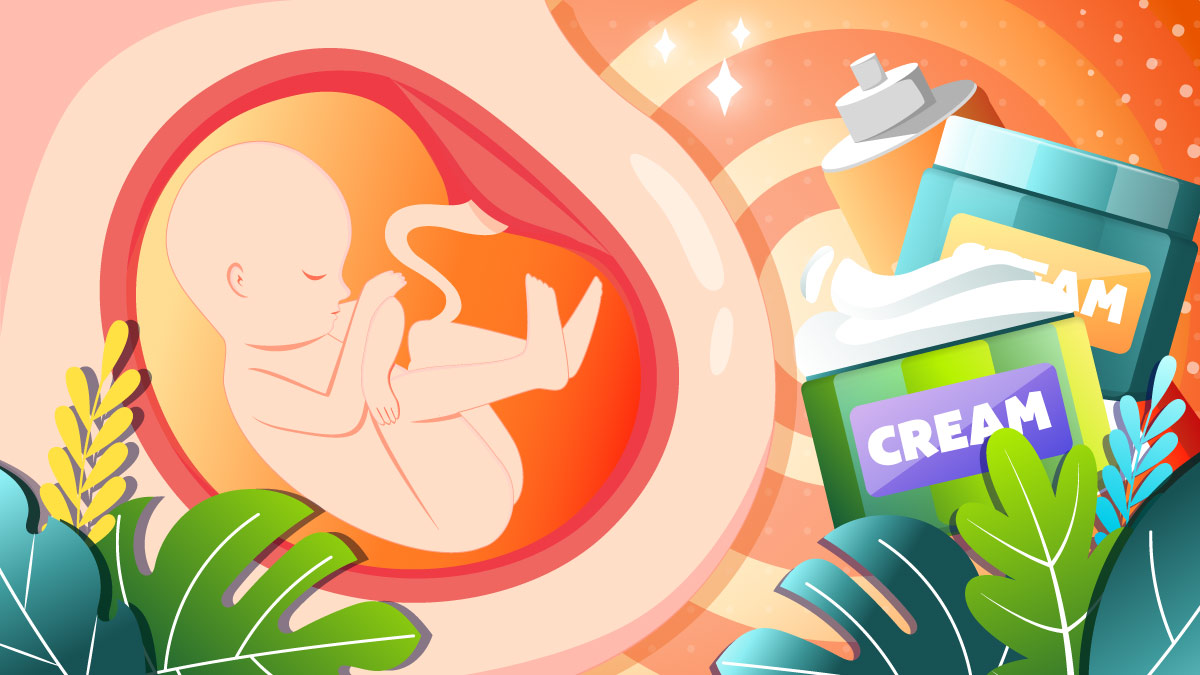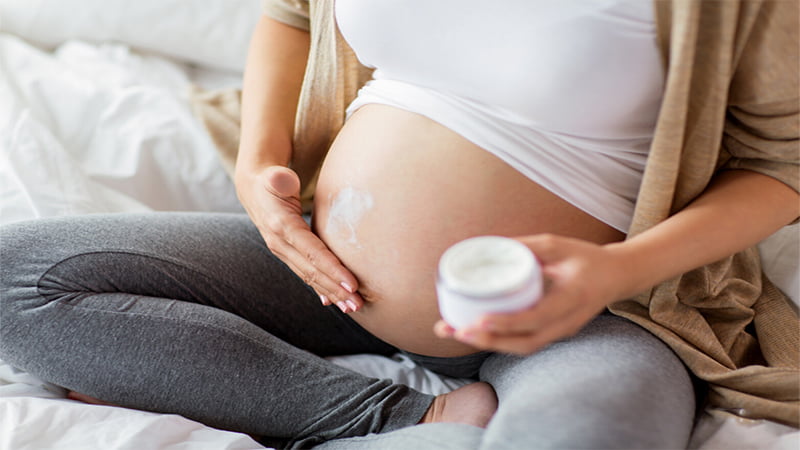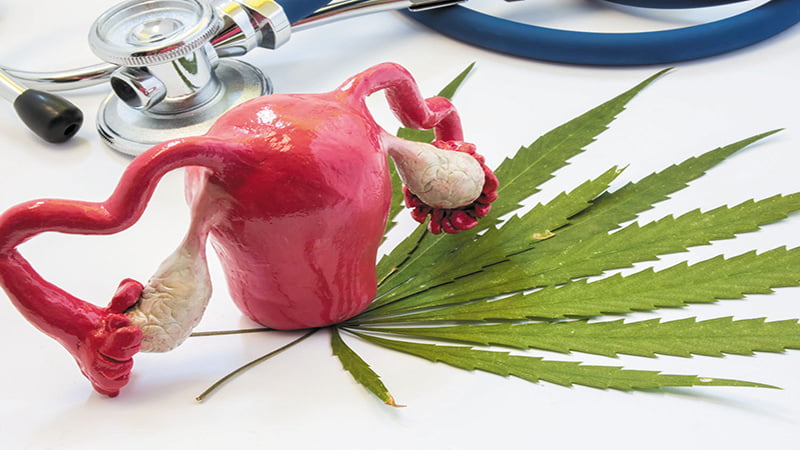CBD Cream and Pregnancy: Is It Safe to Use While Pregnant or Breastfeeding?

More moms are using CBD creams to relieve localized discomfort and manage stretch marks during pregnancy. Some bolder women even take products like CBD oil to ease anxiety, pain, and insomnia, although experts advise that ingestible forms of CBD should be avoided due to their ability to penetrate the placenta.
But, since CBD creams don’t even make it to the bloodstream, they seem to be a safer option during pregnancy.
However, pregnancy and breastfeeding are very sensitive topics when it comes to supplementation — and things are no different with natural, organic compounds like CBD.
In this article, we answer whether or not CBD cream is safe during pregnancy — and why some specialists are concerned.
Why Pregnant Women Are Considering the Use of CBD
CBD is a cannabis-derived compound that can be extracted from hemp or marijuana. Hemp-based CBD products are federally legal because they contain 0.3% or less THC — which isn’t enough to cause a high. They’re also legal on a federal level.
As a modulator of the endocannabinoid system — the prime regulatory network in our bodies — CBD uses multiple mechanisms that produce a wide range of health benefits.
These benefits sound alluring for soon-to-be moms considering the changes that take place in a woman’s body during pregnancy.
Pregnant women are turning to CBD for pain, nausea, anxiety, sleeplessness, fatigue, and mood swings caused by hormonal shifts.
Better yet, these effects are among the best-researched therapeutic properties of CBD — only adding up to its appeal.
However, since pregnancy is a very delicate period during a woman’s life — both in terms of hormones and other physiological changes taking place in the body — it’s important to determine if CBD products are as safe for expecting moms as it is for non-pregnant women.
Can You Use CBD During Pregnancy? Is CBD Cream Safe for Babies?
This is an easy question with a not-so-easy answer.
Long story short, there hasn’t been any proof showing that CBD is safe during pregnancy or even for breastfeeding moms — nor are there any studies suggesting that CBD topicals are dangerous for them.
Health authorities say it’s best to err on the side of caution and abstain from using CBD cream during pregnancy until experts can fully explain how it affects moms-to-be and the growing fetus.
Natural remedies are often considered safer than man-made pharmaceuticals, but then again, pregnancy and breastfeeding are different stories. The studies on CBD and pregnancy are few and far between, not to mention that none of them has touched the subject of using CBD cream during pregnancy.
So, Is CBD Cream Safe During Pregnancy?

Doctors advise women to avoid using CBD, THC, and other cannabinoids during pregnancy. The current stance of the medical community on this subject stems from the body of research regarding THC.
THC, which is CBD’s cousin, crosses the placenta and therefore may end up in breast milk.
THC may also affect a baby’s brain growth. It is also linked to stillbirth at or after 20 weeks of gestation.
Although CBD has been shown to counteract the effects of THC on the brain of adults and adolescents, we still don’t know how it affects fetal development and the further growth of the baby.
The main concern about using CBD cream during pregnancy is that cannabidiol influences female hormones, especially estrogen, which is linked to reproductive health. Although moderate modulation of the endocannabinoid system is believed to ensure hormonal balance and proper reproductive functions, taking CBD while pregnant can breach that threshold and disturb hormones.
For the same reason, women are advised to avoid CBD products when taking estrogen-based contraceptive pills.
To wrap it up, if you’re a mom-to-be, it’s your responsibility to do the research on CBD products, especially in the current state of the market.
CBD products are federally legal, but they’re not FDA approved, meaning you have to trust that the manufacturer follows organic farming practices, eco-friendly extraction methods, and meticulous third-party testing. Doing so will help you make sure that your CBD cream is free of contaminants like pesticides, heavy metals, and bacteria.
Can CBD Cream Reach Your Bloodstream?
When it comes to taking CBD cream during pregnancy, bioavailability is the name of the game.
Bioavailability refers to the leftover amount of an active compound that the body can use once it has been metabolized by the liver. Vaporized CBD demonstrates the highest bioavailability — followed by sublingual and oral products.
With topicals like CBD cream, it’s very difficult to measure their bioavailability because theoretically, none of the CBD reaches the bloodstream. The cannabinoid doesn’t penetrate the deeper layers of the skin unless it’s a transdermal product.
Instead, CBD interacts with the cutaneous endocannabinoid system, specifically with the CB2 receptors.
If you were willing to risk using a CBD-containing product during pregnancy, we would advise creams.
Again, before you purchase any CBD product while pregnant, speak to a holistic doctor so that you can whey the risks and benefits and make a well-thought-out decision.
What Mothers Are Saying About Using CBD Cream During Pregnancy
When you search the internet for anecdotal reports from mothers who have been using CBD cream during pregnancy, you may notice that most of them are swearing by CBD’s efficacy and safety — claiming that it had no negative effects on the development of their children.
The most commonly mentioned health conditions include morning sickness, sleeplessness, pain, stress and anxiety, and food aversions.
Morning sickness can be particularly disturbing, especially when it turns into hyperemesis gravidarum (HG), a condition characterized by chronic, severe morning sickness, where a woman can get sick up to 30 times a day and isn’t able to nourish herself, constantly flirting with dehydration.
CBD seems an appealing alternative to such conditions, considering a slew of potential side effects involved in taking medicines that are typically prescribed by doctors.
Some researchers believe that CBD can curb anxiety during pregnancy due to its interaction with serotonin, GABA, and cannabinoid receptors, which also modulate sensations of nausea.

Most ob-gyns would express concern and remain hesitant about recommending CBD use during pregnancy due to the lack of conclusive research on its safety in pregnant women.
In other words, CBD supplementation and pregnancy are due to the unknown. What we need is long-term research as to what happens in children years after taking CBD by their mothers. We currently lack this data, so any woman using CBD during pregnancy should be aware of this and base their decision on consultation with their doctor.
According to Felice Gersh, MD, who is ob-gyn and the founder/director of the Integrative Medical practice of Irvine in California, the production of CBD supplements is poorly regulated in most states. Until that changes, she advises her pregnant patients to avoid using CBD.
On the other hand, since the federal government lifted the ban on hemp, scientists have been fuelling massive resources into research on the efficacy and safety of hemp-derived CBD. The market has also matured over the years, ultimately leading to safer and better-quality products for consumers.
These advancements, along with the social, political, and scientific shifts of attitude toward CBD, may ultimately reshape experts’ take on CBD cream during pregnancy. In the meantime, it’s important that women work with their health care providers to create a safe supplementation plan that is best for them.
Where to Buy CBD Cream
CBD products can be found virtually everywhere, from wellness centers to beauty shops to cannabis dispensaries and large retail stores. However, no two CBD products are created equal. In fact, there can be a world of difference between two seemingly identical CBD creams.
If you want to make sure your product contains the right amount of CBD, doesn’t breach the THC limit, and is free of contaminants, you need to look for third-party lab reports that relate to the specific batch. Third-party testing is the only way to verify the claims of your vendor.
When you shop for CBD creams locally, the store’s owner may not have these certificates of analysis available for view, so you need to rely on what they consider a high-quality product. As a pregnant woman, giving a leap of faith of that size can be too risky for the child.
If you’re looking for the best deals on high-quality CBD creams, lab-tested products, choose from one of the reputable online stores that meet the said quality and safety criteria. Online brands are usually run by experts whose entire business revolves around hemp-derived supplements. On top of that, since online stores don’t have to deal with the middleman, customers can take advantage of gift cards, coupon codes, or reward programs to save money on top-quality CBD creams.
Key Takeaways on Using CBD Cream During Pregnancy
CBD has an excellent safety profile. According to different health organizations, such as the WHO, the cannabinoid is safe and well-tolerated, even in doses such as 1,500 mg taken daily for several weeks.
However, this data doesn’t involve pregnant and breastfeeding women because it is unethical to run scientific experiments on such subjects. This means that the research on using CBD cream during pregnancy is scarce, and we need more insight from animal models to start assessing the safety of CBD in soon-to-be moms.
CBD can also affect female reproductive hormones, which is the main reason medical experts advise pregnant women to avoid CBD until they give birth.
If you’re considering using CBD during pregnancy, CBD creams are safer than ingestible forms because the CBD doesn’t pass into the bloodstream. That being said, this idea should always be consulted with a doctor who is knowledgeable about cannabis and its effects on fetal development.
Did you take CBD when you were pregnant? How did it turn out for your child? Share your stories in the comment section below!
Sources:
- Thompson, R., DeJong, K., & Lo, J. (2019). Marijuana Use in Pregnancy: A Review. Obstetrical & gynecological survey, 74(7), 415–428. https://doi.org/10.1097/OGX.0000000000000685 (1)
- Natale, B.V., Gustin, K.N., Lee, K. et al. Δ9-tetrahydrocannabinol exposure during rat pregnancy leads to symmetrical fetal growth restriction and labyrinth-specific vascular defects in the placenta. Sci Rep 10, 544 (2020). https://doi.org/10.1038/s41598-019-57318-6 (2)
- Niesink, R. J., & van Laar, M. W. (2013). Does Cannabidiol Protect Against Adverse Psychological Effects of THC?. Frontiers in psychiatry, 4, 130. https://doi.org/10.3389/fpsyt.2013.00130
- Almada, M., Amaral, C., Oliveira, A., Fernandes, P. A., Ramos, M. J., Fonseca, B. M., Correia-da-Silva, G., & Teixeira, N. (2020). Cannabidiol (CBD) but not tetrahydrocannabinol (THC) dysregulate in vitro decidualization of human endometrial stromal cells by disruption of estrogen signaling. Reproductive toxicology (Elmsford, N.Y.), 93, 75–82. https://doi.org/10.1016/j.reprotox.2020.01.003 (4)
- Sales, A. J., Crestani, C. C., Guimarães, F. S., & Joca, S. (2018). Antidepressant-like effect induced by Cannabidiol is dependent on brain serotonin levels. Progress in neuro-psychopharmacology & biological psychiatry, 86, 255–261. https://doi.org/10.1016/j.pnpbp.2018.06.002
- Bakas, T., van Nieuwenhuijzen, P. S., Devenish, S. O., McGregor, I. S., Arnold, J. C., & Chebib, M. (2017). The direct actions of cannabidiol and 2-arachidonoyl glycerol at GABAAreceptors. Pharmacological research, 119, 358–370. https://doi.org/10.1016/j.phrs.2017.02.022 (6)